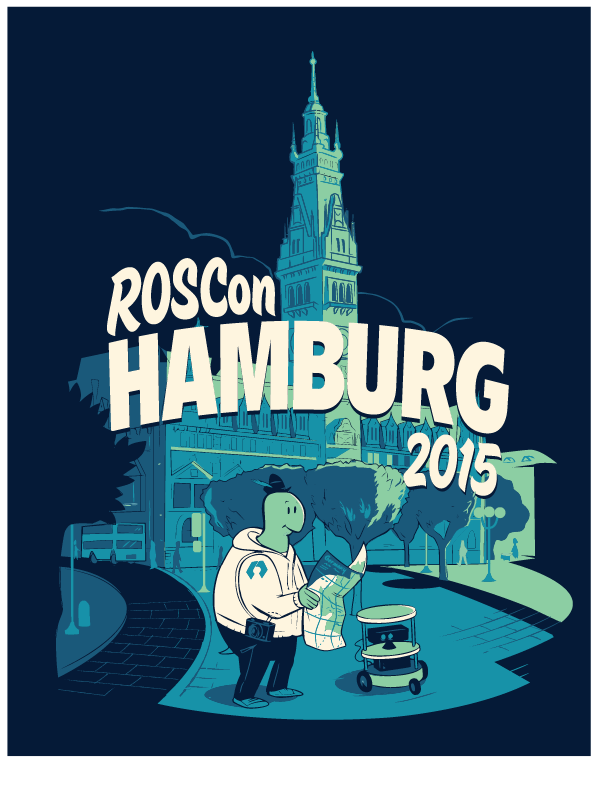The Cloud Robotics initiative was recently kicked off at SPLab.
Invited by one of our collaboration partners, we attended ROSCon 2015 in Hamburg.
ROSCon is the ROS (Robot Operating System) conference, dedicated to all research, development, and practice going around ROS. 2015 was the fourth edition of the event and was so crowded with ROS enthusiasts that was completely sold out.
ROS is the most prominent open source solution for robotic software, with a growing community and widespread industrial interest. Still, its integration with cloud computing is just in its infancy and we wanted to find out more from the problems and needs of the people using it. There is interest in ROS from companies like Canonical, Bosch, BMW, Qualcomm, and Fetch Robotics which were all present at the conference.
For those of you that still don’t know ROS, we highly recommend taking a tour of the ROS wiki Tutorial. ROS is a very exciting technology consisting in a software framework and tools to write robotics software.
“ROS was built from the ground up to encourage collaborative robotics software development”
The basic idea is to provide a common framework for running robotic software allowing researchers / software developers to focus on their specific area of expertise.
ROS nodes are a way to wrap some specific software functionality (e.g., navigation, planning, image processing, control) into a package that has standard way of communicating with other nodes. Nodes implement a distributed system that manages the robot in its devices and functionalities. The current version of ROS requires a master node (roscore) to do act as a registry, but in the upcoming ROS2 nodes will be able to discover themselves.
The nice thing about ROS nodes is that you can download them and combine them to cater for your own needs to develop your own robot or robotic application. There are plenty of ROS nodes available!
But let’s get to the conference…
The conference itself took place under the famous cupola of the main building of the Hamburg University. The main hall was full of ROS enthusiasts of all sorts, from computer scientists, to chip and robots producers, robotic tinkerers, medical and automotive researchers… All in all, it was very refreshing to be immersed in an heterogeneous environment with so many different people excited about a technology and its current and future possibilities.
The main highlights of the event were:
- the talk of Canonical’s Mark Shuttleworth introducing Snappy Ubuntu Core, the new Ubuntu OS supporting transactional updates designed for cloud and devices
- Morgan Quigley’s talk on ROS 2 on embedded systems, referencing RTPS implementations and in particular ICCLab’s and EProxima’s KIARA
- Ruffin White’s talk on ROS and Docker which gave us a good impression of the level of maturity that the community has reached with respect to containerization, container-based applications, management, and continuous development
- Dirk Thomas (OSRF), Esteve Fernandez (OSRF), William Woodall (OSRF) gave a wide perspective of the status of ROS2, some design choices and what will change with the new release
- Jackie Kay (OSRF) gave a brief 101 course on real-time systems to introduce design choices in ROS concerning real-time
- Finally, I personally really enjoyed the Michael Aeberhard’s talk on ROS usage in automated driving at BMW Group Research and Technology
There were two sessions of lightning talks which I found very useful for people to introduce themselves, their work and companies. The common slide for most talks was the “We’re hiring!!!” page, which gave a very clear idea of how thriving and growing the whole ROS community is, also in terms of startups and available funding.
All in all, our impression with the conference was very positive, and we had the chance to establish a few new contacts for our future collaborations in the area. Of course, we also took our time to enjoy the city and its nightlife.

